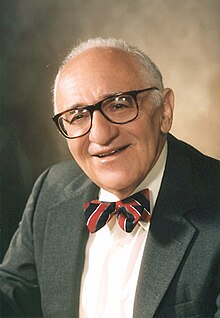Murray Rothbard
| Murray Rothbard | |
|---|---|
 |
|
| Born |
Murray Newton Rothbard March 2, 1926 Bronx, New York City, New York, United States |
| Died | January 7, 1995 (aged 68) New York City, New York, United States |
| Nationality | American |
| Institution |
Brooklyn Polytechnic Institute University of Nevada, Las Vegas |
| School or tradition |
Austrian School |
| Alma mater | Columbia University |
| Influences | John Locke, Ludwig von Mises, Albert Jay Nock, H.L. Mencken, Lysander Spooner, Harry Elmer Barnes, Frank Chodorov, Joseph Schumpeter, Thomas Aquinas, Jean-Baptiste Say, Carl Menger, Aristotle, William Graham Sumner, Herbert Spencer, Franz Oppenheimer, John C. Calhoun, Frédéric Bastiat |
| Influenced | Ron Paul, Walter Block, Lew Rockwell, Joseph Sobran, Thomas E. Woods, Jr., Hans-Hermann Hoppe, Roderick T. Long, Gary North, Joseph Salerno, Samuel Edward Konkin III, Rand Paul |
| Contributions | Anarcho-capitalism, paleolibertarianism, historical revisionism, libertarianism |
Murray Newton Rothbard (/ˈmʌri ˈrɑːθbɑːrd/; March 2, 1926 – January 7, 1995) was an American heterodox economist of the Austrian School, a revisionist historian, and a political theorist whose writings and personal influence played a seminal role in the development of modern libertarianism. Rothbard was the founder and leading theoretician of anarcho-capitalism, a staunch advocate of historical revisionism, and a central figure in the twentieth-century American libertarian movement. He wrote over twenty books on political theory, revisionist history, economics, and other subjects. Rothbard asserted that all services provided by the "monopoly system of the corporate state" could be provided more efficiently by the private sector and wrote that the state is "the organization of robbery systematized and writ large." He called fractional-reserve banking a form of fraud and opposed central banking. He categorically opposed all military, political, and economic interventionism in the affairs of other nations. According to his protégé Hans-Hermann Hoppe, "There would be no anarcho-capitalist movement to speak of without Rothbard."
...
Wikipedia
